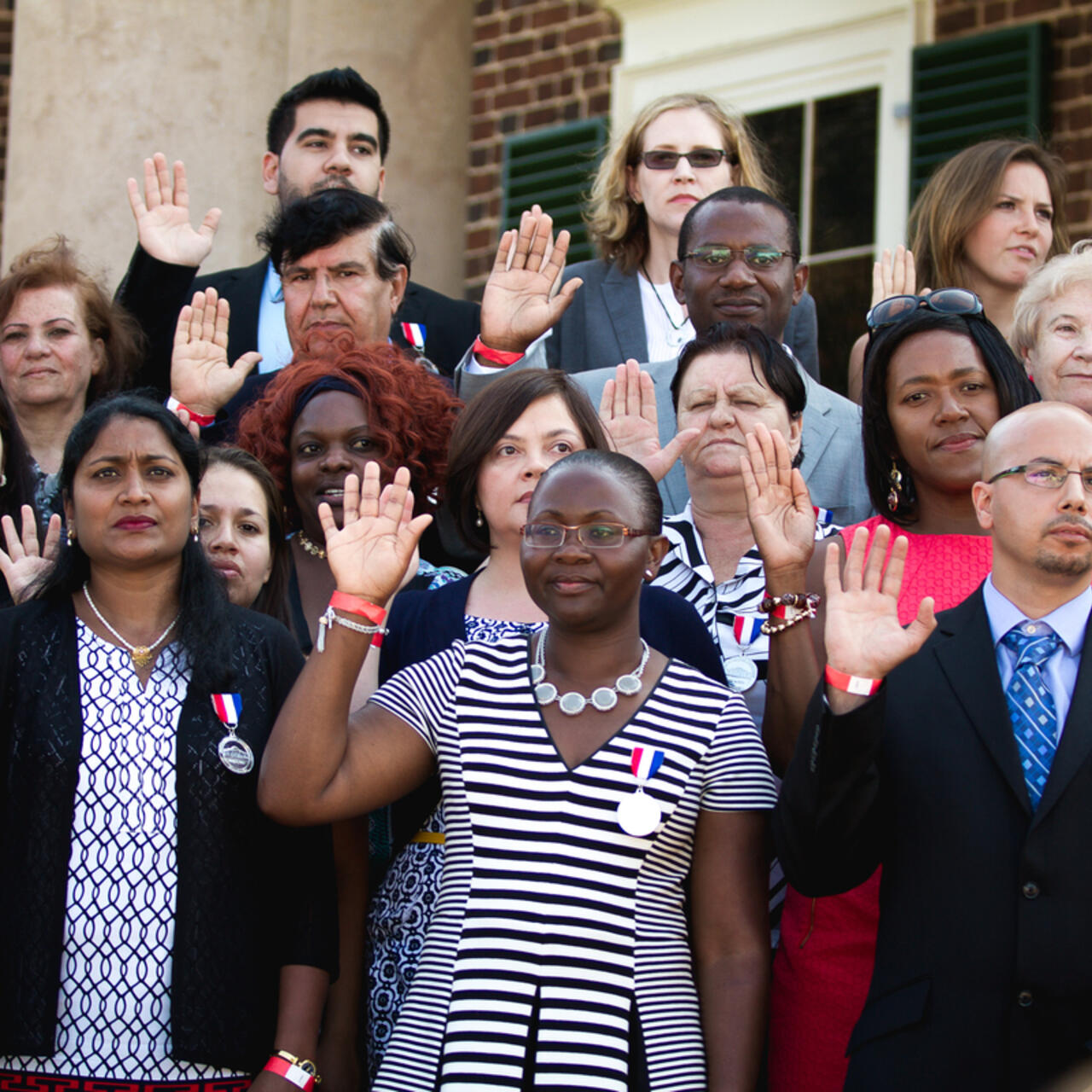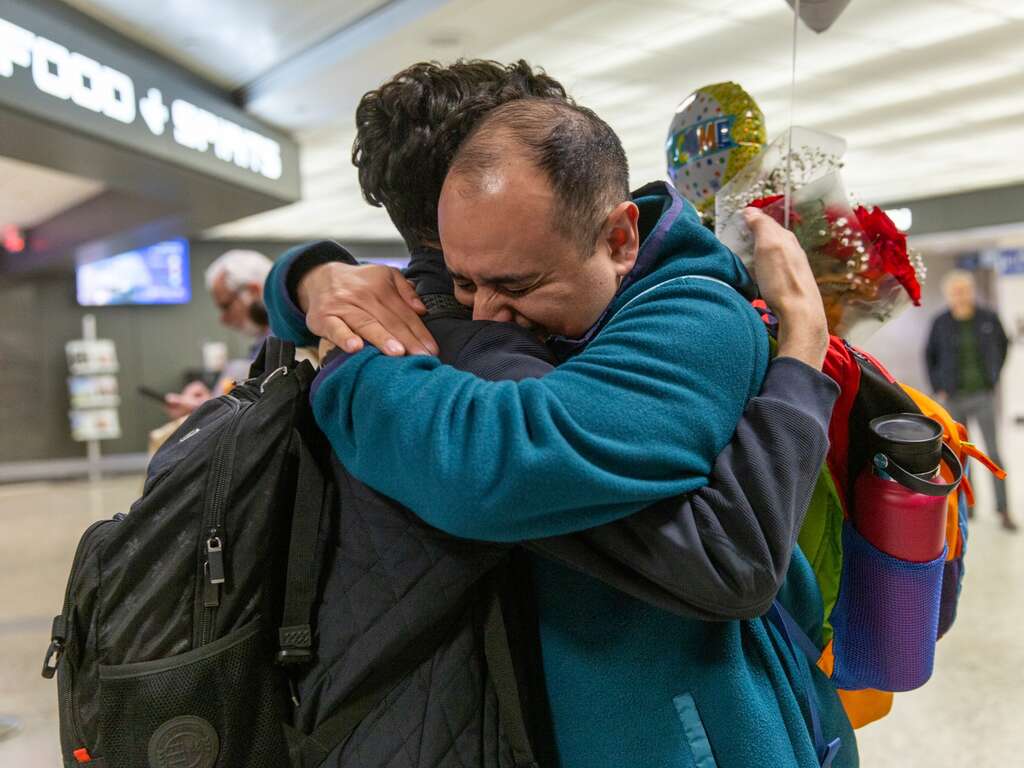
The legacy of the Trump Administration includes a dizzying number of policies targeting people seeking safety in the United States. The administration has turned away refugees, sent asylum seekers into danger, and diminished America’s global standing as a place of refuge for those seeking safety.
President Joe Biden has promised to be different. As a candidate and again after his victory, he committed to raising the refugee resettlement target to 125,000. He also said he would reunite families and reverse policies that have been devastating for asylum seekers.
But what will it take to restore America's legacy of welcome and global leadership, particularly during the worldwide COVID-19 pandemic? As new president begins his term, follow this space for the latest analysis from our colleagues on the ground and at the forefront of policy changes impacting refugees, asylum seekers, and other people facing crises around the world.
The IRC calls on the Biden Administration to urgently set an emergency refugee admissions goal
On March 5, the IRC called on the Biden Administration to urgently set an emergency refugee admissions goal for fiscal year 2021.
The administration has already issued a report to Congress committing to 62,500 admissions this year—a life-saving increase over the limit of 15,000 set by the Trump Administration. However, the president has yet to complete the crucial next step of signing the order to revise the admissions goal.
In the meantime, families remain separated and thousands are looking for hope after years of uncertainty. 232 individuals expected by the IRC have seen the cancellation of their flights. Many of the families left in limbo had been barred by the Trump Administration’s bans on Muslim and African refugees.
“After a torrent of confusing and xenophobic policy over the last four years, Americans and refugees alike are looking to the Biden Administration to right the course, restore access to resettlement for those most in need, and galvanize other countries to increase their resettlement commitments,” says IRC vice president of resettlement, asylum and integration Hans Van De Weerd.
The U.S. officially rejoins the Paris Climate Agreement
On February 19, the U.S. officially rejoined the Paris Climate Agreement.
✅Rejoin the Paris Climate Agreement
— IRC - International Rescue Committee (@RESCUEorg) February 19, 2021
We the Biden Admin for reentering the US into the agreement. Our teams have seen how the climate crisis has multiplied threats of conflict, hunger & forced displacement. How Pres. Biden can act in his 1st 100 days: https://t.co/kyLVMQHIv2 pic.twitter.com/52Xzsb9yyo
A new immigration bill attempts to rebuild the spirit of welcome
Also on February 19, the U.S. Citizenship Act of 2021 was introduced in Congress. The IRC welcomed the move as a step toward rebuilding the spirit of welcome in U.S. immigration policy.
To name a few of its components, the bill would support integration efforts for refugees, asylum seekers and immigrants, as well as reestablish a program that helped unaccompanied minors avoid making the life-threatening journey to the U.S. It also would provide greater capacity and funding for legal orientation and immigration courts (asylum seekers who don’t have legal counsel face an uphill battle with potentially life-threatening consequences) and includes a much-needed surge in aid to help make life safe and livable in Central America.
Finally, the new bill offers a path to citizenship for 11 million undocumented immigrants who live, work, pay taxes, and contribute to American communities.
“The previous administration left an unsafe, unfair and broken asylum system that assumes asylum-seekers are guilty until proven innocent—with life-altering and life-threatening consequences for hundreds of thousands of vulnerable people,” says the IRC vice president of global policy and advocacy Nazanin Ash. “Beyond introducing a humane approach to ensure the dignity and safety of immigrants and refugees, the bill champions integration efforts such that communities have the resources to welcome new Americans and celebrate their contributions to society.”
Learn more about the bill and the IRC’s response.
- Sarah Arnold, February 19, 2021
David Miliband and Nazanin Ash on “the global problems Biden can’t avoid.”
The IRC’s David Miliband and Nazanin Ash published an op-ed with CNN outlining the actions the Biden Administration can take to address the world’s crises. Here they outline the stakes:
In his first days in office, President Joe Biden has prioritized immediate actions in America and for Americans. This is what he promised. But he has also committed to reestablishing international US leadership, with "humility and confidence" as Secretary of State Antony Blinken put it, and started with executive orders on issues like refugees and the pandemic.
These measures lay the foundation for urgent action needed now more than ever in the world's proliferating humanitarian crises, mired in the triple threat of untended conflict, unmitigated climate change and the scourge of Covid-19.
Nowhere has the global retreat from humanitarian obligations been more visible than in the treatment of refugees. Writing with @NazaninSAsh on what the Biden Administration can - and must - do for refugees and people in crisis at home and abroad. https://t.co/CfOoPbNsHB
— David Miliband (@DMiliband) February 11, 2021
President Biden reverses terrorist designation of Ansar Allah in Yemen
On February 5, after President Biden reversed the Trump Administration terrorist designation of Ansar Allah in Yemen—a move the IRC had previously called for because of its ramifications for the delivery of humanitarian aid—IRC CEO and president David Miliband responded on Twitter:
This is a further, vital, correct decision to bring hope to Yemen’s crisis-stricken population. The designation of Ansar Allah would have done nothing to tackle terrorism, and everything to make humanitarian aid and commercial traffic impossible. https://t.co/ST8kLD0cl3
— David Miliband (@DMiliband) February 6, 2021
Rebuilding the bipartisan—and popular—refugee resettlement program
On February 4, President Joe Biden announced that he will sign an executive order outlining a framework to rebuild the U.S. refugee resettlement program, allowing refugees unfairly barred to find safety and families to be reunited.
The order is a step toward the president fulfilling his promise to increase the number of refugees welcomed into America and set an admissions goal of 125,000 for fiscal year 2022 (the new fiscal year will begin in October).
Refugee resettlement is popular in the U.S., even across party lines. While the Trump Administration was slashing the number of refugees allowed in the country, support for welcoming people in need was actually increasing. According to a Pew study, the number of Americans that believe taking in refugees is an important goal grew from 61 to 73 percent over the past three years.
Moreover, over 540 state and local elected officials across all 50 states—including both Republicans and Democrats—have voiced their support for welcoming refugees.
- Sarah Arnold, February 4, 2021

President Biden ends U.S. support for Yemen offensive
The IRC has ranked Yemen as the crisis in the world most at risk of deterioration for three years in a row. A devastating war and health crisis have left 80 percent of the population in need of humanitarian aid.
On February 4, the Biden Administration took steps to, as IRC president and CEO David Miliband put it, “reverse the tide of human misery that has engulfed the country” by ending U.S. support for offensive operations in the country.
While welcoming the move, Miliband urged further action to relieve suffering. This includes a reversal of aid suspensions in areas controlled by the group Ansar Allah—areas that are home to 80 percent of Yemen’s population.
Prior to leaving office, the Trump Administration designated Ansar Allah a terrorist organization. The IRC knows from our work on the ground that all sides of the war use deplorable tactics. But instead of protecting civilians, the move threatens to make effective and efficient delivery of humanitarian aid all but impossible. President Biden can also reverse this decision.
“IRC staff have witnessed Yemen’s suffering at first hand,” Miliband concluded. “They are desperate to have the international community on the side of their clients, rather than being the cause of their misery.”
- Sarah Arnold, February 4, 2021
Alejandro Mayorkas confirmed as Secretary of Homeland Security
On Tuesday, February 2, Alejandro Mayorkas—a former refugee from Cuba—was confirmed as Secretary of Homeland Security.
We welcome @AliMayorkas—a former refugee from Cuba—to President Biden's team as Secretary of Homeland Security. We look forward to collaborating with Secretary Mayorkas to help rebuild the US asylum system and ensure that it promotes humanity and fairness. https://t.co/t7krp5kaMH
— IRC - International Rescue Committee (@RESCUEorg) February 2, 2021
Biden Administration extends and re-designates TPS for Syria
On January 29, the Biden Administration announced it would extend and re-designate temporary protected status (TPS) for Syria. TPS is a classification meant to provide nationals of countries facing disaster, conflict, or danger with temporary protection from deportation. The administration's decision will allow 6,700 Syrians to retain their status.
We welcome the Biden Admin's decision to extend and re-designate temporary protected status for Syria. This will allow 6,700 Syrians to retain their status and opens the way for approximately 1,800 Syrians in the US to apply for protection from one of world's most serious crises. https://t.co/XsjxtzRY89
— IRC - International Rescue Committee (@RESCUEorg) January 29, 2021
Antony Blinken confirmed as Secretary of State
On January 26, the Senate confirmed Antony Blinken as the new Secretary of State under the Biden Administration.
.@ABlinken has just been confirmed as the new U.S. Secretary of State. With decades of experience, Secretary Blinken has a deep commitment to U.S. humanitarian leadership. All of us at the IRC are ready to partner to help restore the US as a force for good. https://t.co/jA7Lr0pM6R
— IRC - International Rescue Committee (@RESCUEorg) January 26, 2021
A step toward defeating COVID-19 across the globe
On President Biden's first full day in office, his administration announced that the U.S. would join an international effort called the COVAX Facility..
What is COVAX and why is it important? Made up of governments and manufacturers, COVAX was created to ensure COVID-19 vaccines reach low-income countries and the people in greatest need.
The U.S. has the potential to contribute a great deal toward expanding access to COVID-19 vaccines. If all vaccines are approved, the country has advance-purchased far more doses than are needed to fully immunize its eligible population—three times the amount, in fact. Sharing these doses through COVAX could fully immunize 235 million people around the world.
The IRC responded to the news that the U.S. would join COVAX by calling on the Biden Administration to take this critical step.
We applaud the Biden Admin's decision to join the COVAX vaccine program as we near 100M global COVID cases and urge this Admin to, in the spirit of equity, commit to sharing the US’ already-purchased excess vaccine doses with low-income countries. More: https://t.co/AZ8kCQ4jih https://t.co/MC3UKGzSxn
— IRC - International Rescue Committee (@RESCUEorg) January 21, 2021
Actions to restore humanity and leadership on day one
On his first day in office, President Joe Biden introduced a number of measures to restore humanity and leadership in the U.S. For one, he presented a sweeping immigration bill to Congress, with a pathway for status and security for 11 million immigrants.that already contribute to American communities.
He also took action by reversing the 2017 Trump Administration Travel Ban, recommitting to the Paris Climate Agreement and the World Health Organization, and preserving and fortifying protections for recipients of the Deferred Action for Childhood Arrivals (DACA) program for young immigrants brought to the U.S. as children, in addition to calling on Congress to enact legislation providing a path to citizenship for these young people.
Explore more actions the Biden Administration can take in its first 100 days.
President Joe Biden sworn in as the 46th president
President Joe Biden has been sworn into office as the 46th president of the United States, alongside Vice President Kamala Harris as the first Black, Asian American and woman vice president in the nation's history.
The new administration begins after four years of an administration that wreaked havoc on the lives of refugees, asylum seekers and other marginalized communities, as well as failed to lead on global crises ranging from COVID-19 to protracted conflicts to climate change.
The Biden Administration has the ability to turn all of this around and is expected to begin the process on day one. Explore seven concrete actions President Biden can take within its first 100 days.
After 4 years of an administration that wreaked havoc on the lives of refugees/asylum seekers & failed to lead on global crises, President Biden has the ability to turn all of this around.
— IRC - International Rescue Committee (@RESCUEorg) January 20, 2021
The concrete actions he can take within his first 100 days: https://t.co/kyLVMQHIv2 pic.twitter.com/G1iwKWaKXl
Samantha Power named head of USAID
On January 13, a week before inauguration day, President-elect Joe Biden announced that he would nominate former United Nations Ambassador Samantha Power to head the U.S. Agency for International Development (USAID). The IRC responded on Twitter:
All of us at @RESCUEorg welcome the nomination of Samantha Power (@SamanthaJPower) for @USAID administrator. A champion for refugees and vulnerable populations, her experience in global affairs and desire to restore U.S. moral leadership is needed now more than ever.
— IRC - International Rescue Committee (@RESCUEorg) January 13, 2021
An asylum system that welcomes those fleeing harm
The IRC responded on Friday, December 18, to new plans released by President-elect Biden that will impact how the U.S. treats asylum seekers at the U.S.-Mexico border.
The incoming administration says it wants to reverse Trump Administration policies like family separation, and released plans that include reforming the asylum system and focusing resources to address the humanitarian crisis at the border. The IRC took to Twitter to applaud the protection-forward approach to ending reckless policies that have exacerbated migration issues in the region.
A reminder: Seeking asylum—even during a pandemic—is legal. Turning away asylum seekers is not. Learn more about how the Biden Administration can reunite families and uphold the rights of asylum seekers.
We look forward to working with the new administration to build a sensible system that welcomes those fleeing harm.
We applaud @transition46's plans for protection-forward asylum system, ending reckless policies that have exasperated migration issues in the region. We look forward to working with the new Admin to build a sensible system that welcomes those fleeing harm. https://t.co/BW0YnibqIl
— IRC - International Rescue Committee (@RESCUEorg) December 18, 2020
A victory for immigrant youth—but there’s still work to do
On Friday, December 4, a federal judge ordered the Trump Administration to fully reinstate Deferred Action for Childhood Arrivals (DACA), the program that protects undocumented immigrants brought to the U.S. as children. The program, which the administration has been trying to shut down since 2017, will have to accept new applicants, and current DACA recipients will secure the right to work for two years, rather than one.
As many as 300,000 new applicants could join the existing 800,000 DACA holders as a result of this change. More young people will no longer have to fear being deported to a country where they may not speak the language and that they may not have seen since they were children, or even infants.
Although President-elect Joe Biden said he would reinstate the DACA program, only Congress can enact a permanent solution. U.S. senators and representatives must pass legislation to provide protection—and a pathway to citizenship—so DACA recipients can live their lives without fear of being deported or separated from their families.
“I have to prepare for my future, but I have to be aware that my plans for my future may not happen,” said Lupe, a DACA recipient and youth leader originally from Mexico who spoke to the IRC earlier this year. The twenty-two year old was clear that preserving the program was only half of the battle.
“We get to breathe for a bit, pero nuestra lucha sigue [our fight keeps going].”
- Sarah Arnold, December 17, 2020

Ending cruel policies at the U.S.-Mexico border
The Trump Administration’s increasingly restrictive policies violate international and U.S. asylum laws and have resulted in inhumane treatment of asylum seekers at our southern border. The Biden Administration will inherit and have to address these policies, which include separating children from their parents, limiting asylum eligibility, and unlawfully expelling people in need of humanitarian protection in the U.S.
While the IRC has outlined comprehensive recommendations needed to protect asylum seekers and preserve pathways for other people seeking safety, it is up to the president-elect's incoming administration to put a new asylum system in place that not only addresses the damage done in the past four years but also pushes the U.S. to do more to ensure the dignity, safety and recognition of rights for all.
- Melinda Frimpong, December 2, 2020
"The US asylum system needs a good hard look. It’s a messy patchwork of different laws and statutes and regulations"
— IRC - International Rescue Committee (@RESCUEorg) November 24, 2020
IRC’s @JCHendrickson on the need to repair America's broken asylum system and our recommendations for how get it done. More in @AJEnglish:https://t.co/YK1TATJVh4
Biden announces foreign policy team
Thanksgiving week in the U.S. began with the announcement of key members of President-elect Biden’s foreign policy team. Former Deputy Secretary of State Antony Blinken was chosen as secretary of state, Alejandro Mayorkas as secretary of the Department of Homeland Security, Linda Thomas-Greenfield as ambassador to the United Nations, and Avril Haines as director of national intelligence. In addition, former Secretary of State and U.S. presidential candidate John Kerry was chosen as a special presidential envoy for climate.
The IRC welcomed the deeply-experienced team and responded with a call, articulated by president and CEO David Miliband, for the cabinet to take urgent action on issues critical to our work.
These issues include global COVID-19 relief—we stressed the need for $20 billion in additional funding—and diplomacy in the world’s toughest conflict zones. We also called for much-needed support for the low and middle-income countries that host nearly 90% of the world’s refugees.
BREAKING: The IRC welcomes Pres-Elect Biden's new foreign policy team, including @LindaT_G @ABlinken @jakejsullivan, and is urging prioritization of global COVID relief, restoration of the refugee resettlement program & more. Read @DMiliband's statement:https://t.co/nzpj0XEn8j
— IRC - International Rescue Committee (@RESCUEorg) November 23, 2020
Miliband’s statement ended with demands closer to home in the U.S.:
“Credible leadership overseas requires bold humanitarian leadership at home. The IRC welcomes the President-elect’s ambitious commitment to welcome 125,000 refugees per year, after a record-low bar of 15,000 this year set by the Trump Administration. The humanitarian crisis unfolding at and below the US Southern border is no different: urgent action is needed to unwind inhumane policies like 'Remain in Mexico,' to surge humanitarian assistance to the Northern Triangle, and to reform the U.S. asylum process by prioritizing both competence and humanity.”
Later in the day, the IRC responded to Alejandro Mayorkas's tweet about his background as a former refugee from Cuba. The nominee for DHS secretary wrote that the U.S. "provided my family and me a place of refuge."
When we welcome refugees, we all benefit. The IRC welcomes @AliMayorkas, a former refugee, to President-Elect Biden's team. We look forward to collaborating with the team to alleviate the border crisis and repair the broken asylum system. More: https://t.co/nzpj0XEn8j https://t.co/TYvCxNWD3B
— IRC - International Rescue Committee (@RESCUEorg) November 23, 2020
- Sarah Arnold, November 23, 2020
A COVID-19 "second wave" sweeps the world
The Biden Administration will have to confront the coronavirus on day one. But while much of the focus will be on the needs of Americans, we cannot forget people in crisis-affected countries abroad. They are likely to be hardest hit as we begin the winter and as they face the virus on top of hunger, rising gender-based violence, and economic collapse.
What can we do? The IRC recently released a report with some key ideas. For one, we know that we need resources. To that end, we’re calling for the Biden Administration to commit $20 billion to attack the virus and to curb the havoc it will cause abroad.
The Biden Admin will take office as #COVID19 worsens overseas and concerns rise over the resurgence of infections in crisis-affected countries like Kenya and Colombia. We're urging this Admin to prioritize pandemic response in humanitarian contexts. More:https://t.co/NJn91W1B7j
— IRC - International Rescue Committee (@RESCUEorg) November 16, 2020
Seems like a lot of money? Think of this: The U.S. and the rest of the G20 and OECD countries allocated $11 trillion to domestic stimulus packages to help their populations in the wake of COVID-19. Just one percent of that amount could protect the world’s poorest 700 million people from the virus. And without protecting everyone from COVID-19, we won’t be able to end the pandemic for anyone.
As the IRC’s vice president of public policy and advocacy Nazanin Ash said when responding to recent vaccine breakthroughs: "We must also not lose sight of the global picture that no solution will comprehensively return us to normality—not even a vaccine—unless the response prioritizes the world’s most vulnerable."
-Sarah Arnold, November 20, 2020

One step closer to 125,000….
On the campaign trail, former Vice President Joe Biden said he would raise the refugee resettlement target to 125,000. He repeated that promise again last week, while speaking to refugee resettlement advocates. The IRC applauded this confirmation of his commitment on Twitter:
The IRC commends President-elect Biden's pledge to restore US humanitarian leadership, renew bipartisan historic norms & to make #RefugeeswWelcome by raising refugee admissions to 125,000. Join us in ensuring America never again shuts the door on refugees: https://t.co/UCZasY8d3J
— IRC - International Rescue Committee (@RESCUEorg) November 13, 2020
One critical phrase we want to emphasize in our response is “restore bipartisan norms.” When President Trump lowered the refugee resettlement target to a new low each year, he was bucking a tradition in his own party. The average refugee resettlement target of both Republican and Democratic administrations is 95,000. President Ronald Reagan even set a target of 140,000 one year—higher than President-elect Biden’s goal! Here’s what the famous Republican had to say about it:
"We shall continue America’s tradition as a land that welcomes peoples from other countries. We shall also, with other countries, continue to share in the responsibility of welcoming and resettling those who flee oppression."
Want to learn more? Take our quiz to test your knowledge of U.S. presidents and refugees.
-Sarah Arnold, November 19, 2020
